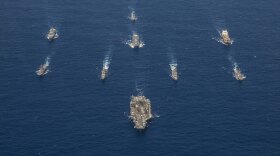The complicated politics of the former Soviet Union don’t often affect the South Pacific, but two disputed territories that broke away from Georgia are about to cause headaches in the impoverished and far off island nation of Nauru. Neal Conan unravels the diplomatic knot in today’s Pacific News Minute.
Long part of the Soviet Socialist Republic of Georgia, South Ossetia and Abkhazia tried to breakaway after the collapse of the Soviet Union, and finally managed to do it after the lopsided five day war between Russia and Georgia in 2008. Moscow promptly recognized both as independent countries. The only other countries that offer them diplomatic recognition are Venezuela, two other break away states - Transnistria and Nagorno-Karabakh and Nauru.
Tuvalu and Vanuatu used to be on that list, but changed their minds.
This week, when Georgia’s Prime Minister Giorgi Kvirikashvili visited Washington, President Trump signed a spending bill which includes an amendment reaffirming U.S. commitment to Georgia’s sovereignty and territorial integrity. The law goes onto describe South Ossetia and Abkhazia as Georgian territories occupied by Russia, and bans U.S. financial support to any countries that recognize them as independent states. That part of the law extends to U.S. representatives in International Institutions, and that’s where Nauru’s problems start to accumulate. The U.S. is a major contributor to the World Bank, The U.N. Children’s Fund, the World Health Organization and the U.N. Fund for Population Activities, all active in Nauru, and, most important, the U.S. provides funds to the Asian Development Bank, which has approved loans and grants to Nauru totaling almost 30 million dollars.




